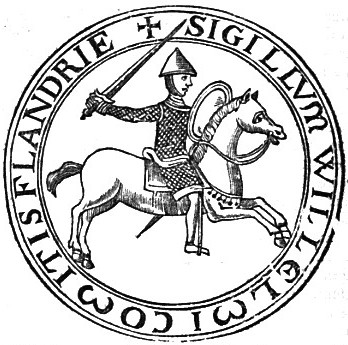
29th July 1128
It was announced today that twenty-five year-old William Clito, the heir to Robert Curthose, former Duke of Normandy, has died of an infected wound at Aalst in Flanders. William Clito, along with his confederate, Godfrey of Louvain, had been besieging the town of Aalst since 12th July as part of his bid to retain the disputed title of Count of Flanders (see pictured seal).
Details are lacking but it seems that William Clito was wounded either by a sword thrust to the arm or by an arrow. After examination by his physician the wound was declared minor. A full recovery was expected within a matter of days.
Unfortunately William Clito’s famous bad luck pursued him until the end. Within a few days the wound turned gangrenous, he fell into a fever and his medical staff prepared him for the worst. He died yesterday, 28th July, and his remains will be buried according to his wishes at the Abbey of Saint Bertin in Saint-Omer.
Sad tale ends for heir without inheritance or posterity
William Clito was from first to last an unfortunate young man. His mother died soon after his birth, and his father lost a major battle in 1106 when Clito was only four years old. Since then his father has been a prisoner of his uncle, the English King Henry 1st, a captivity which has already lasted twenty-two years. Clito’s unfortunate father, Robert Curthose, ex-Duke of Normandy, failed to safeguard his son’s inheritance and passed him nothing but humiliation and a tarnished name.
As a young boy, William Clito was brought up in the household of the loyal Hélias de Saint Saens, where he was given knightly training and a hearty appetite for revenge. Clito bore an enduring grudge against his uncle Henry 1st, whose illegitimate seizure of Normandy and capture of his father he wished to punish and avenge.
Final moments of penitence?
Sources say that in his last moments Clito wrote a letter to his uncle, begging mercy for his father, and asking Henry to pardon all those who had supported his cause, promising that they would take new oaths to Henry.
Before his death, William Clito, the heir without inheritance, who leaves no legitimate heir of his own, expressed a wish that his mortal remains be conveyed to the Benedictine Abbey of St Bertin. In due course he will be posthumously accepted into the order and buried there as a monk.
To find out more about William Clito, see Deaths, Disasters and Destinies: Anglo-Norman History in Twelve Lives, Chapter Eight "The Cousins’ Tragedy".